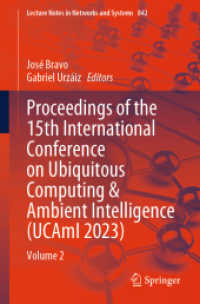- ホーム
- > 洋書
- > 英文書
- > Business / Economics
Full Description
Diversification is the principal economic objective for the Gulf States. The steep and sustained fall in oil prices over the last few years has added to the collective urgency to seek new sources of revenue. As such, the overriding theme of regional economic summits in recent years has focused on the question, "how do we transition to a knowledge-based economy?"
This is the central question taken up by the contributors to this volume. A growing body of literature has begun to address how state policy in conjunction with universities, think tanks, and businesses can create the groundwork to support knowledge-intensive industries. But, so far, comparatively little work has been done on the potential of this matrix of policies to succeed in the current political and economic context of the GCC.
This volume assesses current policies designed to engender knowledge-based economies in the region and analyzes how a diverse array of actors, including government agencies, national and transnational businesses, universities, and individuals coordinate and mediate the transmission of knowledge to support knowledge-intensive industries.
This volume is based on a workshop held at the Gulf Research Meeting organized by the Gulf Research Center Cambridge in summer 2015.
Contents
Preface
1. Transnational Knowledge Relations for Building Knowledge-Based Societies in the Gulf
Rasmus Gjedsso Bertelsen, Neema Noori and Jean-Marc Rickli
PART I: PUBLIC POLICY
2. The Role of Technology Entrepreneurship in Promoting Sustainable Development in the GCC
Daniel Goldman
3. The Development of Knowledge-Based Centers in the GCC
Pia-Kristina Anderson
4. Interrogating Qatar's Urbanity as a Catalyst for Building Knowledge-Based Societies and Economies
Ali A. Alraouf
5. The Role of Universities in the Innovation Systems of the Gulf: Gateways to the World of Knowledge?
Eric Baark
6. Japanese Efforts to Build Smart Power in the Gulf
Isam R. Hamza
PART II: BUSINESSES
7. Japanese Multinationals Breaking with their Business Groups: Opportunities for Global Organizations
Camilla Nellemann
8. Proposal for the Establishment of the "Bahrain Industrial Partnership Innovation Centre"
Ebrahim Radhi
9. A Preliminary Study on Strategies of Chinese Firms Collaborating with Gulf Nations' Firms
Gao Xudong
PART III: INDIVIDUAL STRATEGIES
10. An Empirical Test of the Predictors of National-Expatriate Knowledge Transfer and the Development of Sustainable Human Capital
Sheikha Shamma bint Sultan bin Khalifa Al Nahyan and Laura L. Matherly
11. Interprofessional Healthcare Collaboration: A Qualitative Exploration of the Facilitators and Barriers to Effective Collaboration in Qatar
Michael K. Corman and Jason Hickey
12. Arab Expatriate Health Professionals
Heba Nassar
13. 'Outsiders' in France, 'Westerners' in the Gulf. Motives for Expatriation in the Professional Trajectory of Second-Generation French Graduates of North African Descent
Martin Lestra and Elyamine Settoul
About the Contributors







